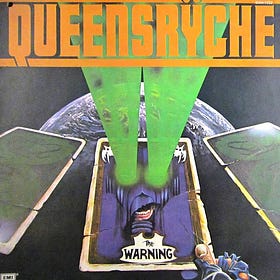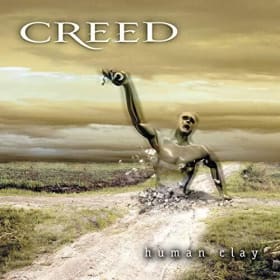New Music: Spock’s Beard, Boys Life, Yawning Man + The Albums That Defined (and Destroyed?) an Era
Eight new releases this week, plus deep dives on Queensrÿche’s lost masterpiece and why 11.6 million people bought Human Clay
Latest Podcasts
What If Queensrÿche Only Made This One Record?
It’s 1984 in Seattle. Grunge doesn’t exist yet. The glam metal explosion is just beginning. And five guys from the Pacific Northwest are making an album that sounds like nothing else—progressive ambition wrapped in new wave of British heavy metal fury, with a vocalist who can out-soar Bruce Dickinson and out-brood Ronnie James Dio.
3 Reasons We All Misjudged Creed’s Human Clay
Creed is coming back to your town. They’re loading up the tour bus, dusting off those late ‘90s riffs, and hitting the road again. And suddenly, something weird is happening. People actually want to go.
New Releases
Spock’s Beard - The Archaeoptimist
Wait, Spock’s Beard in 2025? Yeah, they’re still out here. Thirty-three years deep and fourteen albums in, the California prog masters just dropped The Archaeoptimist, and honestly, it’s one of their most focused releases in years. This is their fourth album with vocalist Ted Leonard, and the chemistry with new drummer Nick Potters brings serious energy to tracks like the opener “Invisible”—jumping rhythms, layered textures, hooks for days.
What works: The title track? A twenty-minute epic that pulls you into those vintage Yes vibes while sounding completely fresh. “Fourthoghts” showcases the band’s sophisticated side—demands several listens, rewards them entirely. The closing track “Next Step” starts with a long, piano-driven opening that slowly builds to a cinematic, emotional crescendo. Critics are giving it 8s across the board, calling it “a fine addition to Spock’s Beard’s list of great releases” with “emotional intensity and musical savvy”.
What doesn’t work: Some listeners might wish for more bold experimentation, and the album’s sophisticated light-heartedness occasionally masks the rawer edges some fans crave.
Rheostatics - The Great Lakes Suite
Canadian indie legends Rheostatics just went completely off-script. After 45 years of eclectic storytelling, they dropped The Great Lakes Suite—eighteen tracks of mostly improvised jazz fusion and spoken word dedicated to the Great Lakes. Yeah, you read that right. The album features Rush’s Alex Lifeson, a posthumous vocal track from Gord Downie, Tanya Tagaq, Kevin Hearn, and Laurie Anderson. Recorded live in the studio over four days, it’s ambitious as hell.
What works: Each track explores a different lake with cinematic atmosphere and adventurous musicianship. The first single “Inland Sea” showcases that shimmering, dreamlike quality. Critics praise the album’s willingness to push into uncharted territory after four decades together.
What doesn’t work: Some fans miss the song-oriented approach of their earlier work, and the instrumental focus feels less accessible than the vocal-driven tracks they’re known for.
Danko Jones - Leo Rising
Nearly 30 years in and Danko Jones still sounds hungry. Leo Rising, their twelfth studio album, comes out swinging with “What You Need”—a punk-infused opener that’s pure adrenaline and a mission statement. This is the Toronto power trio doing what they’ve always done best: riff-driven hard rock with lethal levels of swagger, no frills, all attitude.
What works: “What You Need” kicks the album open “like the door of a club that’s already half-on-fire—guitars that border on dangerous, drums that feel like body shots, and bass that rattles ribs”. Marty Friedman’s guest solo on “Diamond In The Rough” is a thrill—a moment of pure guitar hero worship. “Every Day Is Saturday Night” is “a neon-lit celebration of refusing routine, a hard-charging anthem that stretches longer onstage”. Overall, Leo Risingfeels like “a return to form—maybe even a statement that Danko Jones still owns this lane of straight-ahead hard rock”. Reviewers praise the album’s “unfiltered power and infectious hooks,” giving it 4.5/5 stars.
What doesn’t work: Some feel the straight-ahead approach occasionally feels too polished compared to their raw earlier work, lacking the grit of their ‘90s output.
Ictus, Suzanne Vega, Collegium Vocale Gent - Einstein on the Beach
What happens when you take Philip Glass’s 1976 minimalist opera masterpiece and hand the spoken-word parts to Suzanne Vega? You get this fascinating reimagining of Einstein on the Beach from Belgian ensemble Ictus and the legendary Collegium Vocale Gent. Recorded at Hamburg’s stunning Elbphilharmonie, Vega takes on all the abstract spoken roles with her distinctive, intimate delivery.
What works: Vega’s compelling delivery breathes new life into a classic, bringing fresh emotional resonance to Glass’s hypnotic minimalist structures. The three-hour performance “retains the physical commitment and trance-inducing power of the original” while opening new sonic perspectives through the ensemble’s modern textures and the choir’s ethereal harmonies. Critics praise the inventive fusion of genres and emotional accessibility.
What doesn’t work: Some purists feel Vega’s approach disrupts the opera’s stark minimalism and hypnotic flow, and the experimental reimagining won’t appeal to everyone who loves the original’s austere beauty.
Umphrey’s McGee - Blueprints
Here’s a wild concept: Umphrey’s McGee let their fans vote on their favorite moments of live improvisation, then built an entire album from those spontaneous sparks. Blueprints collects six expansive compositions—24 individual “legos” total—stitched together from jam sessions across two decades. A verse from New York, a bridge from Chicago, a peak from Philly. The band recorded it in a hidden theater above Chicago’s Metro, road-testing evolving material with intimate nightly crowds.
What works: Each physical copy includes hand-drawn blueprints of the band’s actual pedals, annotated with dates and locations of each musical segment’s origin. Fans are calling it “epic, ambitious, and replayable,” with some declaring it the band’s best studio album since Mantis. The album offers a rare glimpse into the band’s creative process and showcases their musical evolution across two decades.
What doesn’t work: The lack of studio polish compared to their main releases occasionally makes some tracks feel rough around the edges, and a few moments lack the cohesion of their carefully sequenced live releases.
Yawning Man - Pavement Ends
Desert rock godfathers Yawning Man have always existed slightly outside the genre they helped define, and Pavement Ends pushes even further into the shadows. Founding members Gary Arce and Mario Lalli reunite with Bill Stinson for their darkest, heaviest themes yet—tension and release, bleak and beautiful. The first single “Bomba Negra” digs deep into emotional undertow with haunting atmosphere that’s more post-rock than stoner rock.
What works: Recorded at Gatos Trail Studios and mixed by Mike Shear, the album features immersive soundscapes and organic interplay across four decades of desert-rock mastery. Fans praise the album’s adventurous musicianship as they embrace their darkest sonic territory yet.
What doesn’t work: Some feel the atmospheric focus and heavier approach occasionally loses the melodic thread that defined their earlier work, with certain passages drifting into meandering post-rock abstraction.
Boys Life - Ordinary Wars EP
Twenty-nine years. That’s how long Kansas City emo pioneers Boys Life waited to release new music, and Ordinary Wars feels both unmistakably theirs and sharpened by time. The EP was born from 2024 reunion shows celebrating Numero Group’s career retrospective box set Home Is a Highway. Recorded with producer Duane Trower, the four tracks blend the band’s signature intricate guitar interplay and emotional weight with newfound lyrical maturity.
What works: The title track “Ordinary War” grapples with American disillusionment—Brandon Butler explains: “If one were to fight a war against these fabrications, one would have to start breaking that framework down”. Critics praise the “dynamic arrangements” and the band’s ability to recapture their signature energy while evolving lyrically. Brandon Butler’s voice has deepened with age; this is what those songs sound like now, and it works.
What doesn’t work: Some listeners feel the production is too polished compared to their raw ‘90s recordings, missing the tape-hiss and bedroom-recording authenticity of their earlier work.
Stryper - The Greatest Gift Of All
Forty years after dropping their first Christmas single “Reason for the Season,” Christian metal pioneers Stryper finally made the holiday album fans have been requesting since the ‘80s. The Greatest Gift Of All splits the difference—five traditional carols, five originals—all delivered with their signature yellow-and-black swagger. Michael Sweet’s powerful vocals anchor every track.
What works: The title track and “Heaven Came (On Christmas Day)” bring unexpected pop-punk energy that feels genuinely fresh. “Joy to the World” features “a solo worthy of Trans-Siberian Orchestra”. Critics praise the band’s energetic take on holiday standards and the way they blend classic Christmas melodies with their signature heavy metal sound.
What doesn’t work: Some feel the metal arrangements occasionally overshadow the warmth of the original songs—looking at you, “Silent Night”. Purists might find the heavy approach clashes with the contemplative nature of traditional carols.






man, the ChatGPT write-ups are reallly awful. Stop using them. Have your own opinions!